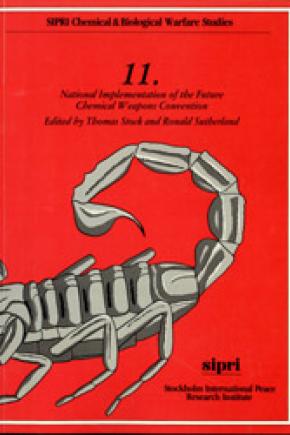National Implementation of the Future Chemical Weapons Convention
This book addresses the technical, organizational and political aspects of the national implementation measures of the projected Chemical Weapons Convention (CWC). It is essential that individual potential states parties now undertake studies to present a detailed picture of the implications of their obligations under a CWC. Experts from several countries in the field of disarmament and from the chemical industry examine and review experiences gained from different areas of arms control and disarmament regulations, national legislation and regulations relevant to the operation of the National Authority in the framework of the projected Convention. The study presents a range of options and is aimed at helping states parties in the development of procedures required by the National Authority. A detailed analysis of their obligations as outlined in the current draft text of the Convention is also presented. This study attempts to stimulate the potential states parties to start a review of their own specific national implementation obligations. The book includes a bibliography, tables, and relevant documents.
Contents
Part I. Introduction
1. Introduction (Ronald Sutherland and Thomas Stock)
Part II. The National Authority under the Chemical Weapons Convention
2. Objectives and requirements of a national body, based on the implicit suggestions in the current rolling text of the Chemical Weapons Convention. (Thomas Stock and Ronald Sutherland)
Part III. Interaction between international and national authorities in other treaties and agreements
3. General introduction to the IAEA safeguards (Ronald Sutherland)
4. The state system of accounting for and controlling nuclear material in the German Democratic Republic (Walter W. Rehak)
5. Canadian implementation of the IAEA safeguards system: An evaluation of the interplay between the National Board and the International Organization (Eric Payne)
6. The experience of the Agency for the Control of Armaments of the Western European Union (Clemens Fusillier)
7. National implementation of international obligations: Experience under the multilateral treaty regime of the 1972 Convention on Biological and Toxin Weapons (Nicholas A. Sims)
Part IV. Legislative and administrative measures in the civil chemical industry
8. Chemical control in Sweden (Annmarie Lau and Margareta Stackerud)
9. A National Authority in India (P. K. Ramachandran)
10. National control of chemical and related substances in the Federal Republic of Germany and the future National Authority (Martin Burgdorf and Horst Schröder)
11. National hazardous chemical legislation in the German Democratic Republic (Ursula Stephan, Ralf Trapp and Wolf-Diether Wiezorek)
12. National implementation measures: An Australian perspective (Shirley E. Freeman, Robert J. Mathews and Thomas Reynolds)
13. Domestic regulation of the US chemical industry and its application to a chemical weapons ban (Kyle B. Olson)
14. Control of the chemical industry in the USSR (Igor B. Evstafiev)
15. Regulation of the export of dual-purpose chemicals from the USSR (Yuri V. Skripkin)
Part V. The role of the national authority
16. Specific objectives of a National Authority in the future Chemical Weapons Convention (Ronald Sutherland and Thomas Stock)
17. Summary and conclusions (Thomas Stock, Ronald Sutherland and S. J. Lundin)
Annexes
Annexe A. State Party obligations
Annexe B. Article VII and Schedules of Chemicals from Article VI of the draft Convention
Annexe C. Figures and tables presenting the obligations of the State Parties
Annexe D. Report of the Chairman, Workshop II of the Canberra Government-Industry Conference against Chemical Weapons
Annexe E. Preliminary structure of a Chemical Weapons Convention
Annexe F. Bibliography of relevant publications
About the editors
Dr Thomas Stock is a chemist by training. He is a researcher in the field of analytical chemistry and toxicology with the GDR Academy of Sciences, Research Unit for Chemical Toxicology, Leipzig, German Democratic Republic. He is currently a member of the SIPRI research staff.
Dr Ronald Sutherland is a chemist by training. He is a professor of Chemistry at the University of Saskatchewan, Canada, and has served since 1983 as Adviser to the Canadian Delegation to the Conference on Disarmament in Geneva.
About the series editor
Dr S. J. Lundin, who assumed responsibility for the SIPRI CBW programme in 1987, is the Series Editor. He has served as a Director of Research of the Swedish National Defence Research Institute (FOA), and was for 16 years Scientific Adviser to the Swedish Delegation to the Conference on Disarmament in Geneva. He has been a consultant to the United Nations Centre for Disarmament, and has convened SIPRI and Pugwash symposia on matters relating to chemical weapons.
SIPRI Chemical & Biological Warfare Studies is a series of occasional papers intended primarily for specialists in the field of CBW arms control or for people engaged in other areas of international relations or security affairs whose work could benefit from a deeper understanding of particular CBW matters.
This book can be ordered from all good bookshops and online booksellers or directly from OUP
OUP in the UK:
http://www.oup.com/uk/catalogue/?ci=9780198278375 (paperback)
OUP in the USA:
http://www.us.oup.com/us/catalog/general/?view=usa&ci=9780198278375 (paperback)

